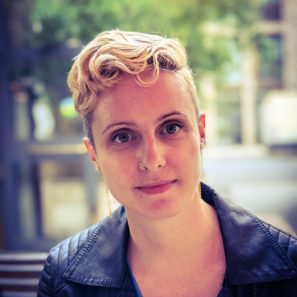Meet me where I am: speaking the language of offline citizens
Kat Dixon is a research fellow with the Data Poverty Lab. Over three months, she’s investigating community-led initiatives which enable good access to the internet for people experiencing data poverty. These blog posts track her journey and thinking.
Gone fishing
Jeremy* is in his late sixties. He’s at the local village hall having a coffee. Last week, someone asked him if he wanted help getting online. He said, no thanks, he’s happy as he is.
This week, Kaye* asks Jeremy what he’s doing with his afternoon. He’s going fishing. She asks what fish he’s hoping to catch and they chat happily about carp, using sweetcorn as bait, and how his favourite rod is getting a bit old.
After ten minutes, Kaye pulls out a tablet. Did he know he could renew his fishing licence online? Kaye shows him a map with some local fishing spots. An online shop with a rod he’s had his eye on – it’s cheaper online.
Suddenly, Jeremy is very interested. This internet thing might not be so bad.
‘Not interested’
About 6% of UK homes do not have access to the internet, which means about 1.5 million people are offline. 15% of over-75s in the UK have no interest in getting online at all.
But what does ‘no interest’ mean? In my experience, many people, when asked if they want internet, will say no. But if asked if they want to push a button and chat to their grandkids on this screen, their answer is often different.
Why don’t some people want to be online?
During my research on data poverty, I’ve noticed that lots of people feel left behind by the internet. It all too moves quickly – they feel too far behind and can’t catch up.
And what would they need the internet for anyway? That’s for fancy stuff, the games their grandkids play. What would they even use it for?
Yet, simple things like online grocery shopping, video calls with family, and streaming TV can make a huge difference in someone’s quality of life. Lots of people who reject the concept of the internet don’t know about these options, or feel too intimidated to explore.
The right to be offline
Some people know all the options and really don’t want to be online. That’s a fair choice we must respect.
The Welsh Government has made sure all their essential services have an offline option (this is called Digital First). In many ways we have a duty to allow people not to have their data counted, to live full offline lives.
Education as empowerment
But, in the digital inclusion debate, when we talk about motivation – ‘skills and will’ – we need to be careful we’re not dismissing citizens because they seem stubborn. ‘Will’ suggests they are ‘unwilling’.
Moving into the digital world is scary. It might seem too technical, or irrelevant. Lots of people need education and support, so that they can feel empowered online. This is especially true for people who grew up without the internet or didn’t get a chance to play with computers as kids.
New technologies offer new options. Aisha*, who is bed bound, found new freedom from a doorbell which links to her phone. She feels safer now. Lee* lost their sight quickly and retreated into social isolation. They were too nervous to leave the house but found online Zoom support groups, with other people with macular degeneration, a lifeline.
The risk of parentalism
I believe strongly in the principles of ‘nothing about me without me’, which means services and access are only designed with the people they support. There’s a concerning parental voice in what I’ve said so far, as if I know better what someone wants or needs.
I’m sitting with that discomfort – it’s important to listen to it. I’m white, middle class, privileged and biased. Just because I think the internet has great opportunities, doesn’t mean I should push that on others.
A complicating factor is the role of essential services. In much of the UK, citizens have to be online to claim benefits, register for tax, talk to their GP or apply for jobs. If we’re not engaging everyone, we’re leaving them behind.
Informed choice
I believe anyone excluded from the online world should have the chance to learn about what they can do and make an informed choice of how much or little they want to be online.
That means meeting people where they are – talking about fishing, or baking, or TV, or their grandkids. Everyone deserves the chance to thrive online. We need local trusting relationships in our communities, and for digital inclusion teams to bring people on the journey.
The Data Poverty Lab is formed by Good Things Foundation. All views expressed here are Kat’s own.

Kat Dixon
Data Poverty Lab Fellow
Kat Dixon is a digital inclusion advocate and one of our Data Poverty Lab Fellows, exploring community-led solutions to data poverty. Kat is Director of Partnerships at national charity Catch22 and has built digital skills and inclusion programmes with TikTok, Microsoft, Salesforce, Raspberry Pi and more. She champions inclusive co-design, the power of public-private partnerships and the transformative possibility of digital access. Kat previously scaled international healthcare innovations in the UK.
